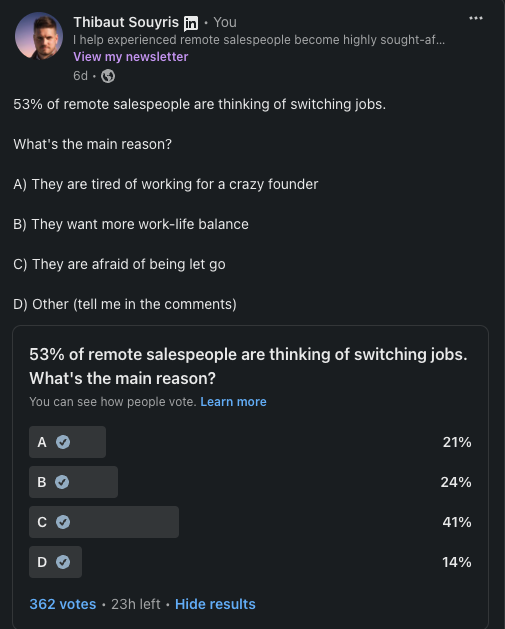I added WhatsApp to my prospecting routine, should have done it earlier
In today’s newsletter, I’ll share how I included WhatsApp in my prospecting routine, and how you can do it too.
Prospecting has changed in 2024. It’s getting harder than ever to book meetings with prospects. Their mailboxes are flooded with crappy AI-generated icebreakers and emails. They can’t erase shitty prospecting messages fast enough.
Trying to start conversations with total strangers only is a recipe for disaster. Even if your email game is solid, you’re a cold call machine, or a LinkedIn wizard, you won’t start enough conversation to build enough pipeline with cold outreach.
That’a why I recommend adding WhatsApp to start conversations with people you already know.
Here’s how, step-by-step:
Step 1: List building
As usual, you need to build a lead list. But instead of building a list of strangers, go back to your CRM and pull a list of prospects and customers who already know you.
List your current customers, old customers, closed lost, prospects who replied to your cold outreach, and everyone you’ve been in touch with at some point.
Now, find their phone numbers, add them to your contact list, and see if they are on WhatsApp (most people are).
This is where I need to do a small precision.
If you want to use WhatsApp to communicate with your prospect, the best way is to ask them while you’re having active conversations with them. You can ask something like:
“Pierre, I found that using WhatsApp is an easy way to answer questions you may have without having to book a meeting, or send a long email. Opposed to sharing your WhatsApp number?”
Some will refuse, but a lot will be fine sharing their numbers.
Step 2: WhatsApp call
You have a list of prospects, with WhatsApp numbers. Give them a call using WhatsApp. You’ll face two situations; they’ll reply, or ignore you.
If they reply, you can use a variation of this script:
“Pierre, how are you doing? Wanted to reach out on WhatsApp since most people don’t answer to unknown numbers. Last time we talked, you mentioned [key initiative]. Is it still relevant?”
If you need more call script ideas, you can check my Prospecting Template Swipe File.
If they don’t reply, go to step 3.
Step 3: WhatsApp voicenote
This is where the magic happens. I personally filter who I speak to on the phone. If someone calls me, but I’m busy, or if I want to avoid a conversation, I’ll ignore a call.
That’s what most people do.
Instead of writing a lengthy message, you can drop a WhatsApp voice note. Humans are curious by nature and a voice note is hard to ignore. You want to know what’s behind.
You can use the same script as in step 2, and ask your prospect to call you back or drop a message back (this options often works better).
I tried this tactic last week, and I booked 1 meeting, and generated 1 opportunity. I did a detailed video if you want to learn more.
Hope this helps.
Cheers,
Thibaut Souyris
P.S. When you’re ready, here are 3 ways I can help you:
Subscribe to the Newsletter
Get my free, 4 min weekly newsletter. Used by 5.900+ salespeople to book more meetings and work when, where, and how they want.
Subscribe to the Newsletter
Get my free, 4 min weekly newsletter. Used by 5.900+ salespeople to book more meetings and work when, where, and how they want.




